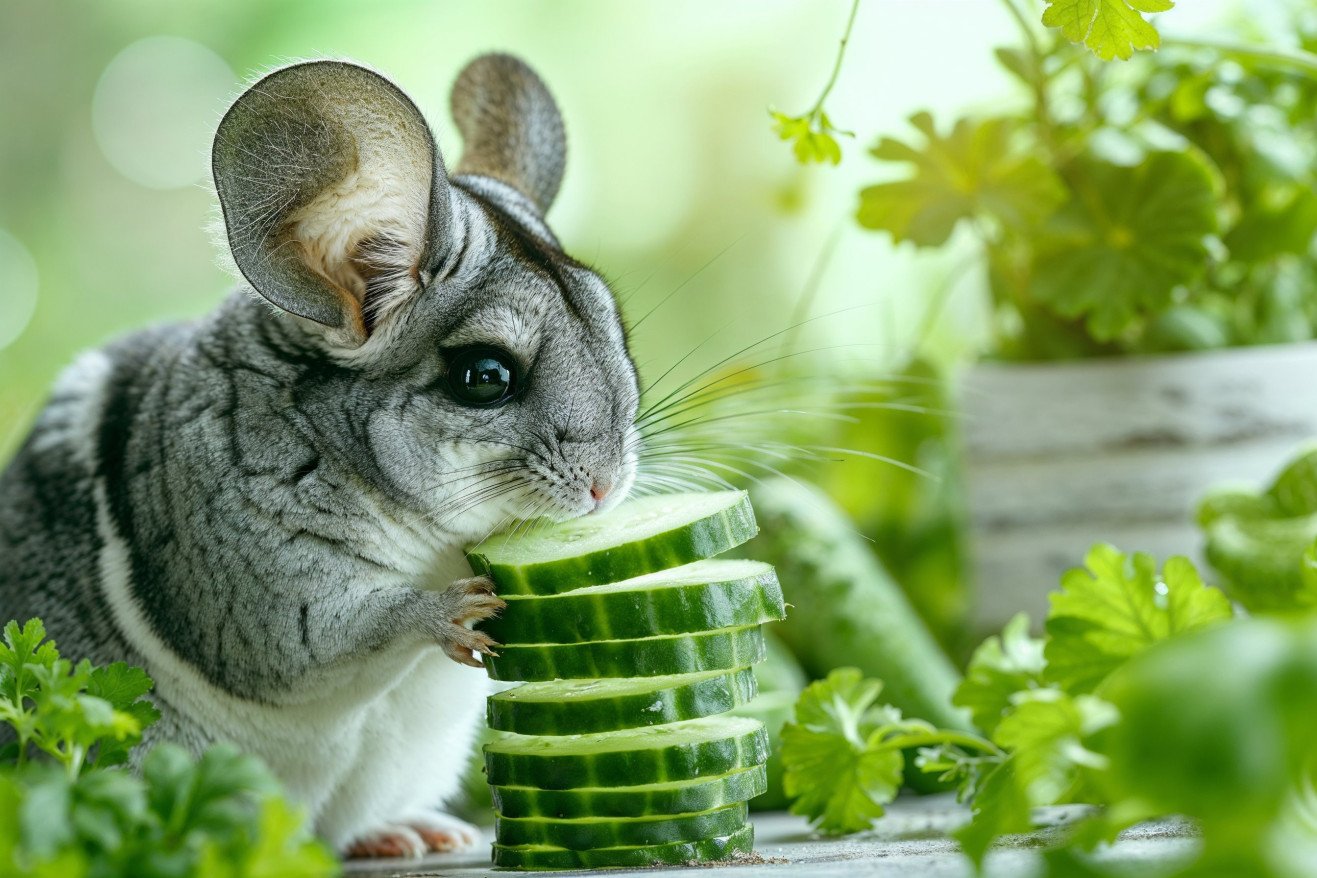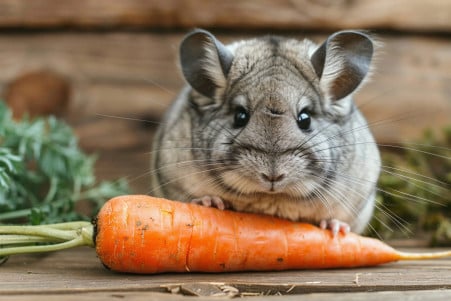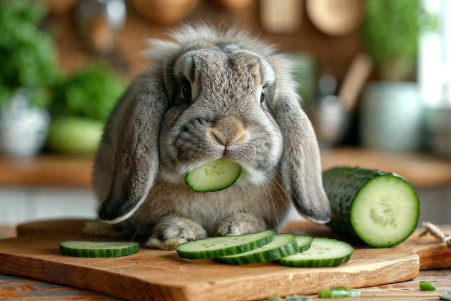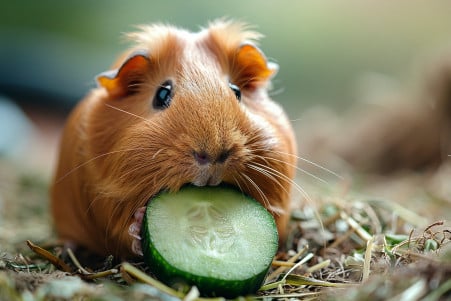Can Chinchillas Eat Cucumber? Diet Dos and Don’ts Explained
20 January 2024 • Updated 28 January 2024

It’s cool, refreshing, and easy to find, but can you give your chinchilla cucumber? It’s best to avoid giving chinchillas cucumbers because they have a high water content and low nutritional value, which can lead to bloating and diarrhea. Instead, make sure to give chinchillas a diet that includes high-fiber hay, pellets, and the occasional treat, such as rose hips and herbs.
This article will delve into the scientific research that supports the dietary recommendations for chinchillas, which includes information from both veterinarians and nutritional research. It will also look at how cucumbers measure up to the nutritional needs of chinchillas, including the problems with their high water content and the importance of fiber. Finally, it will look at the studies and advice that show why cucumbers don’t meet chinchillas’ nutritional needs.
Can chinchillas eat cucumber?
How to Feed Chinchillas: A Breakdown of Their Nutritional Needs
Chinchillas require a diet that is high in fiber and low in fat, which is consistent with their natural eating habits in the wild. In the wild, chinchillas eat grasses and leaves. According to the PDSA, pet chinchillas need a high fiber diet to help with digestion and dental care, just like their wild relatives.
Fresh grass hay is the most important part of a chinchilla’s diet because it provides the fiber that chinchillas need to keep their digestive system working properly and to help keep their teeth from getting too long.
In addition to hay, The Spruce Pets explains that chinchillas should also be fed good quality chinchilla pellets, which will provide a well-balanced diet. The best pellets are low in fat and high in fiber, which will help ensure that the nutritional content of the pellets is similar to what chinchillas would eat in the wild.
UK Pet Food notes that pellets should make up no more than 25% of a chinchilla’s diet, which will help ensure that hay is the main part of their diet.
Chinchillas are delicate animals that need to be fed on a regular schedule. Feeding them at the same time every day can help prevent digestive problems and keep them healthy.
In addition, treats should be fed sparingly and should be low in fat and high in fiber, like rose hips, instead of high in sugar and low in fiber, like fruit. By following these guidelines, chinchilla owners can make sure that their pets are healthy and happy.
The Chinchilla’s Specialized Digestive System
Chinchillas have a specialized digestive system that is designed to process high-fiber, low-energy-density foods. As concentrate selectors and hindgut fermenters, chinchillas have evolved to process large amounts of fibrous material, which is important for their gastrointestinal health and dental wear. In a study published in PubMed, Micah Kohles explains how chinchillas use their unique colonic separation mechanisms to extract nutrients from fiber more efficiently, a process that is important for their survival.
The importance of a high-fiber diet for these small herbivores cannot be overstated. Enzyme activity studies, including the one conducted and published by C. R. in the Canadian Journal of Zoology, have shown that chinchillas ferment cellulose in the large intestine, where they produce essential volatile fatty acids. These fatty acids are an important source of energy and help maintain a healthy gut microbiome.
However, their specialized digestive system can also make them susceptible to common gastrointestinal diseases if they aren’t fed a proper diet. Feeding them the wrong foods can cause imbalances that can lead to serious health problems, such as gas or diarrhea. It’s important for chinchilla owners to understand their pets’ dietary requirements to avoid these issues.
As we start to look at specific foods, we can see why things like cucumbers, which are high in water, aren’t a good choice for chinchillas.
Cucumbers Can Cause Digestive Problems in Chinchillas
Cucumbers may be a common salad ingredient for humans, but their high water content can be problematic for chinchillas. Chinchillas are originally from dry areas, so they aren’t adapted to eating foods with a high water content.
A study from ScienceDirect explains that water and feed intake are closely related, and the water content of the feed has a direct effect on the total water intake. If chinchillas eat cucumbers, which have a high water content, they may take in too much water, leading to bloating and digestive problems, which can be dangerous for the animals.
In addition, cucumbers don’t meet the nutritional needs of chinchillas. Chinchillas need a diet that’s high in fiber and low in fat, but cucumbers are low in fiber and don’t have the energy density that chinchillas require. This can upset their digestive systems and lead to gastrointestinal diseases. The study stresses the importance of feeding chinchillas a diet that’s consistent with their natural low water intake and that meets their nutritional needs.
By avoiding cucumbers and other high-water foods and focusing on the high-fiber foods that chinchillas need, owners can make sure their pets get the nutrition they need to stay healthy and happy.
Cucumbers vs. Chinchilla Nutritional Requirements: A Nutritional Showdown
On the surface, cucumbers’ high water content and low calories may make them a safe option for chinchillas. However, Antoine Sambou’s research published in the Journal of Horticultural Postharvest Research shows that cucumbers’ nutritional makeup doesn’t meet the nutritional requirements of chinchillas.
Although cucumbers do contain important vitamins and minerals, their high moisture content and low nutritional value make them inappropriate for these animals. Chinchillas need a diet that contains 15–23% crude fiber, and cucumbers don’t come close to meeting this requirement.
On the other hand, Love My Chinchilla explains that chinchillas need a high-fiber diet. The fiber in their primary food source, hay, is important for their digestion and dental health, and cucumbers don’t provide the fiber chinchillas need. In addition, cucumbers don’t contain the fat and protein levels that chinchillas require, further demonstrating that cucumbers aren’t a good choice for chinchillas.
In summary, cucumbers aren’t toxic to chinchillas, but they don’t provide the nutrients chinchillas need. Instead, chinchilla owners should opt for healthier choices like Timothy hay, alfalfa, or chinchilla pellets that meet their pets’ nutritional needs and are similar to their natural diets. These choices will help ensure that chinchillas get the nutrition they need and help them stay healthy.
Chinchilla Care: Prioritizing Good Nutrition
In our quest to provide the best care for our chinchillas, we’ve gone over why cucumbers aren’t the best choice for a treat for these small animals. In this article, we’ve stressed the importance of a diet that’s high in fiber and low in fat, which is necessary for the health of chinchillas.
Their digestive systems are set up to process fibrous foods, but not the high water content in cucumbers, which can lead to health issues like bloating and diarrhea.
We’ve also shown how cucumbers don’t meet the nutritional needs of chinchillas, pointing out that they don’t have enough fiber and have too much water. Instead, chinchillas need a diet that’s based on hay and specially formulated pellets to make sure they get the right nutrients and keep their teeth healthy.
It’s important for us to know what our chinchillas need to eat and make sure we’re providing it for them. By focusing on the right dietary choices and making sure we’re feeding our chinchillas the right amounts, we can help them live longer, healthier lives. In the end, the care we provide shows how much we value their quality of life, and that can help strengthen the bond between us and our pets.


